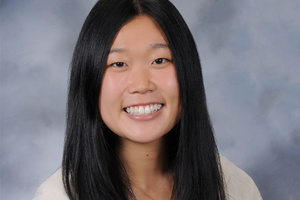
Hometown: San Jose, California
Major: Neuroscience and Behavior
Minor: Peace Studies
Somin Jo was interviewed by current peace studies undergraduate student Matthew Macke (‘21).
Matthew Macke: Why did you choose to pursue a minor peace studies?
Somin Jo: I chose peace studies after attending a lecture given by former secretary-general of the UN Ban Ki Moon [sponsored by the Liu Institute for Asia and Asian Studies] my sophomore year. I had always been passionate about issues related to justice, human rights and peace, but never really thought about pursuing a formal education in these topics until that lecture. His lecture about global citizenship motivated me to look into what I could study here at Notre Dame, and I came upon peace studies. I immediately declared my minor, and I'm very happy to have made that decision.
How have your neuroscience studies influenced your view of peace studies and vice versa?
Being a neuroscience student, I find it important to understand how violence detrimentally affects the mental health and well-being of victims, as well as what peacebuilders can do to address the psychological damages that violence and injustice do to people living in conflict-filled areas. Simultaneously, being a peace studies student, I find it important to utilize neuroscience research to promote just practices in the community. I am focusing on how I can use my privilege as a Notre Dame student to share scientific advances that benefit and educate the community, including people who don’t have a scientific background.
As a pre-med student and someone who has worked in a variety of clinical settings, what do you think is the medical field's role in advancing social justice? Has the pandemic had any impact on how you understand this role?
As a pre-med student, I believe that the medical field needs to do better in advancing social justice. The way in which health care is structured in the U.S. marginalizes minorities and low-income individuals, which has further been exacerbated during the pandemic.
I wrote a paper for Dr. Calvin Zimmermann's “Race and Ethnicity” class that focused on how the pandemic has unearthed hidden racism in the U.S. and found that there are disproportionate rates of hospitalization and death in primarily Black and Latino communities as compared to white communities. Access to healthcare is a right that everyone equally is entitled to, and I advocate that health professionals work toward promoting equality in the medical field.
You are a 'Study Abroad Influencer' here at Notre Dame How and why do you think study abroad is beneficial for someone interested in studying peace?
I studied abroad in Seoul, South Korea, and took an elective for peace studies with students coming from countries all across the globe. In this class I heard different perspectives, opinions, and ideas that I have never thought about before and was able to escape the invisible bubble that surrounds students, especially those from the States. Peace studies is multifaceted, and I strongly believe that there is a need for diversity in studying peace to fully understand the complexity of conflicts and how we can facilitate transformation.
Have there been any classes or professors that have had a notable impact on you?
I took Dr. Nancy Michael's Developmental Neuroscience class last fall, and it truly was one of the most rewarding classes that I have ever taken. Dr. Michael taught me the ways in which you can take complicated neuroscience topics and incorporate it in ways that allow us to become more empathetic, trauma-informed individuals. I had the privilege to work with a local psychiatric center and utilize the skills that I learned in class to develop training modules on how relationships can heal trauma. Beyond this class, Dr. Michael is someone that has made such a positive impact on me because of her empathy, kindness, and passion for all things that she does.